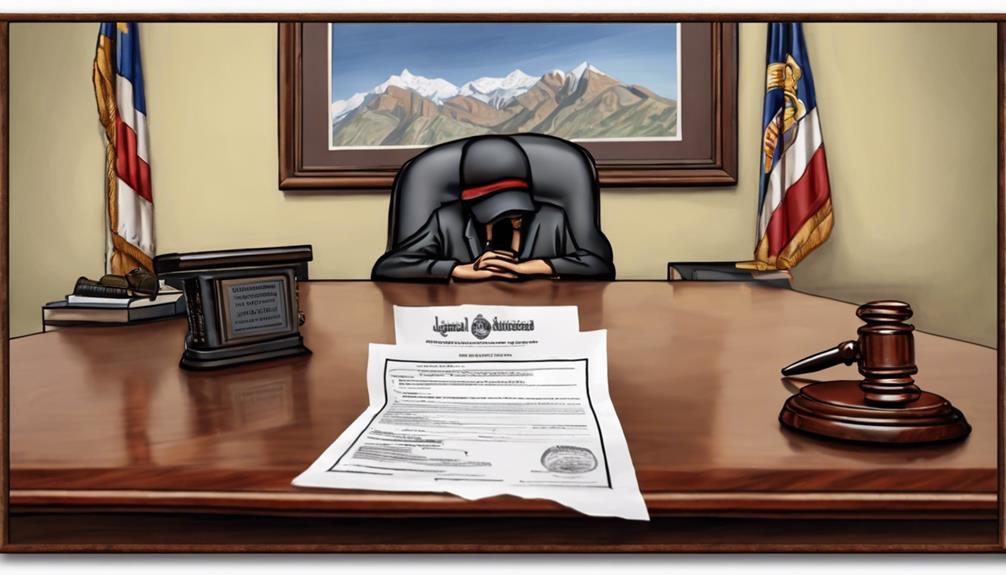As we embark on the unexpected journey of navigating a divorce, it’s crucial to remember that healing is a gradual process that requires patience and self-care practices.
While the initial shock and emotional turmoil may seem overwhelming, finding ways to cope and move forward is crucial for our well-being.
By exploring ten healing strategies tailored to help us overcome the pain of an unwanted divorce, we can begin to pave a path towards a brighter future.
Key Takeaways
- Accept and process emotions gradually for healing.
- Seek support from friends, family, or professionals.
- Engage in self-care practices for emotional well-being.
- Set boundaries with ex-partner and focus on personal growth.
Acknowledge and Accept Your Emotions
Acknowledging and accepting our emotions is the first crucial step towards healing after experiencing an unwanted divorce. It's vital to recognize that feeling shock, disbelief, anger, sadness, and betrayal are natural responses to the loss that accompanies divorce. By allowing ourselves to feel and process these intense emotions, we create space for healing to begin. Embracing the fact that experiencing a range of emotions is part of the grieving process can help us navigate the complexities of an unwanted divorce.
In this challenging time, it's essential to practice self-compassion and patience. Showing kindness and understanding towards ourselves as we work through these emotions is key to moving forward. By accepting our feelings without judgment and giving ourselves the time and space to heal, we can begin to rebuild and rediscover our strength. Remember, healing after an unwanted divorce is a process, and it's okay to feel a mix of emotions as we journey towards a brighter future.
Lean on Support Systems

During this challenging time of navigating through the emotions of an unwanted divorce, seeking support from friends, family, therapists, or online communities can provide invaluable comfort and guidance. Support systems play a crucial role in helping us cope with the complexities of such a difficult experience.
Talking to understanding friends or family members can offer emotional support, while therapists provide professional guidance to navigate the healing process. Additionally, online communities or support groups can connect you with individuals who've gone through similar situations, offering a sense of belonging and understanding.
Sharing your feelings and experiences with a supportive network can help alleviate feelings of loneliness and isolation. Knowing that you aren't alone in your struggles can be reassuring and empowering. These support systems can offer practical advice, a listening ear, and a safe space to express yourself openly.
Embracing the support available to you is a vital step in navigating the healing journey after an unwanted divorce.
Prioritize Self-Care Practices
Engaging in nurturing self-care practices post-divorce is essential for promoting mental and emotional well-being during the healing process. After experiencing an unwanted divorce, prioritizing self-care becomes paramount in rebuilding our sense of self and finding inner peace. Here are some key self-care practices to consider:
- Exercise: Physical activity releases endorphins, which can help alleviate stress and boost mood. Incorporating exercise into our routine can also improve our overall well-being during this challenging time.
- Healthy Eating: Fueling our bodies with nutritious foods can have a positive impact on our mental health. Eating a balanced diet rich in vitamins and minerals can support our emotional resilience post-divorce.
- Proper Sleep: Establishing a bedtime routine and ensuring we get adequate rest is crucial for our healing process. Quality sleep enables our minds and bodies to recover, rejuvenate, and better cope with the emotional turmoil of divorce.
Establish Healthy Boundaries

Establishing healthy boundaries post-divorce is crucial for protecting our emotional well-being and fostering a sense of control in our new life. Setting boundaries with your ex-partner can protect your emotional well-being by reducing conflicts and stress.
Clearly defined boundaries around communication and personal space not only maintain control but also support your healing process after an unwanted divorce. These boundaries reinforce self-respect and help you navigate the transition into your new life with more ease.
By setting limits and sticking to them, you empower yourself to create a safe and stable environment for your emotional growth. Remember, boundaries aren't walls but rather guidelines that promote healthier interactions and relationships.
It's essential to communicate your boundaries assertively and consistently, ensuring that they're respected. Embracing healthy boundaries is a powerful step towards regaining your sense of self and moving forward in your healing journey.
Engage in Positive Distractions
Let's talk about how engaging in positive distractions like healthy hobbies and mindful relaxation techniques can be incredibly beneficial during the healing process after an unwanted divorce.
These activities have the power to shift our focus away from the pain we're experiencing, allowing us to find moments of joy and fulfillment amidst the challenging emotions.
Healthy Hobbies for Healing
Exploring new hobbies or rediscovering old passions can be a transformative way to navigate the healing process after an unwanted divorce. Engaging in activities that bring us joy and fulfillment is crucial during this challenging time.
Here are some healthy hobbies to consider for healing:
- Painting: Express yourself creatively and process your emotions through art.
- Gardening: Connect with nature, nurture living things, and find peace in the process.
- Cooking: Experiment with flavors, nourish your body, and find relaxation in the kitchen.
These hobbies not only offer a positive distraction but also serve as avenues for self-care, personal growth, and rediscovering joy post-divorce. Remember, healing is a process, and engaging in activities you enjoy can be a vital part of that journey.
Mindful Relaxation Techniques
Engaging in mindful relaxation techniques can be a beneficial way to shift focus from negative emotions and promote emotional healing following an unwanted divorce. By incorporating practices like deep breathing, meditation, yoga, or tai chi, individuals can reduce stress levels and enhance emotional regulation during the healing process. Additionally, engaging in positive distractions such as reading, listening to music, or going for a walk can provide a much-needed break from the overwhelming emotions associated with the divorce. These activities serve as therapeutic distractions, allowing individuals to find moments of joy and fulfillment amidst the healing journey. By prioritizing these mindful relaxation techniques and positive distractions, one can create a supportive environment for emotional healing after experiencing the challenges of an unwanted divorce.
| Benefits of Mindful Relaxation Techniques |
|---|
| – Reduce stress levels |
| – Promote emotional healing |
| – Enhance emotional regulation |
Challenge Negative Thought Patterns

Challenging negative thought patterns is crucial in the healing process after an unwanted divorce. It involves examining evidence, practicing cognitive restructuring, and engaging in positive self-talk. When facing overwhelming negative thoughts, it's essential to take active steps to combat them.
Here are some strategies to help you challenge and overcome those destructive patterns:
- Examine Evidence: Start by questioning the validity of your negative thoughts. Look for concrete evidence that supports or refutes them.
- Practice Cognitive Restructuring: Replace negative thoughts with more balanced and realistic ones. Challenge the accuracy of your beliefs and work on reframing them positively.
- Engage in Positive Self-Talk: Counteract negative thinking patterns by intentionally speaking to yourself in a compassionate and encouraging manner.
Rediscover Your Personal Identity

Rediscovering our personal identity after a divorce can be a transformative journey towards self-empowerment and self-awareness. It's essential to reflect on our interests, passions, and values from before the marriage, as they can serve as guiding lights in reconnecting with our true selves.
Exploring activities and hobbies that resonate with our authentic self can bring joy and fulfillment, aiding in the process of self-discovery. Engaging in therapy or counseling can provide a supportive environment to delve deeper into our identity and values, facilitating personal growth and understanding.
Embracing our uniqueness outside of the relationship allows for increased self-awareness and empowerment. By rekindling our connection to our personal identity, we pave the way for a more profound understanding of ourselves and a brighter path forward post-divorce.
Explore New Hobbies and Interests

Let's embark on a journey of self-discovery through trying new activities and embracing fresh interests. Engaging in hobbies we enjoy can offer a sense of purpose and joy, helping us navigate through the challenges of post-divorce healing.
Try New Activities
Trying out new activities and exploring fresh hobbies and interests can be a rejuvenating and empowering way to navigate life after an unwanted divorce. Engaging in new activities brings a sense of fulfillment, allowing you to rediscover passions and find a renewed sense of purpose.
Here are some benefits of trying new activities:
- Boost Self-Esteem: Exploring different activities can boost your self-esteem and confidence during the healing process.
- Social Circles: Engaging in new hobbies can introduce you to new social circles and experiences.
- Moving Forward: Finding joy in new hobbies and interests can aid in moving forward and embracing a fresh chapter in life.
Exploring these new avenues can provide a sense of growth and positivity during this challenging time.
Embrace Fresh Interests
Exploring new hobbies and interests post-divorce can offer a refreshing opportunity to embrace personal growth and discover hidden passions. Engaging in activities that spark joy and curiosity can help shift your focus from the pain of the divorce towards a brighter future.
Trying out new hobbies not only opens doors to new experiences but also allows you to meet like-minded individuals, expanding your social connections and support system. Embracing fresh interests serves as a positive distraction during the healing process, providing a sense of fulfillment and accomplishment.
As you delve into different pursuits, you may uncover talents and interests that were overshadowed during your marriage, leading to a renewed sense of self and purpose in this new chapter of your life.
Allow Yourself to Heal at Your Own Pace

Allowing ourselves the space and time to heal at our own pace is crucial in navigating the emotional journey following an unwanted divorce. It's vital to acknowledge the depth of our feelings and emotions during this challenging period. Rushing through the healing process can impede emotional recovery and acceptance of the divorce we didn't desire.
Key Points to Consider:
- Acknowledge Feelings: Recognize and validate the array of emotions you're experiencing post-divorce.
- Practice Self-Compassion: Be kind and understanding towards yourself as you navigate this difficult time.
- Respect Your Unique Journey: Understand that healing is a personal process, and your timeline for recovery may differ from others.
Embrace the Future With Optimism

As we navigate the challenges of an unwanted divorce, embracing the future with optimism can be a beacon of light guiding us towards healing and growth. Maintaining a positive mindset allows us to hold onto hope for better days ahead, fostering resilience in the face of uncertainty.
Let's remember that cultivating optimism isn't just about looking past the pain but about paving the way for a brighter and more fulfilling life beyond divorce.
Positive Mindset for Healing
Cultivating a positive mindset after an unwanted divorce can significantly contribute to our mental well-being and resilience as we navigate the path towards healing. Embracing a positive outlook is crucial for our emotional well-being during this challenging time.
Here are some strategies to help foster a positive mindset:
- Focus on new beginnings: Embracing the idea of starting fresh can open doors to exciting opportunities and personal growth.
- Stay hopeful: Maintaining a positive outlook can help us overcome the emotional turmoil and navigate the healing process with grace.
- Visualize finding peace: Envisioning a future where we've found inner peace and contentment can motivate us to keep moving forward.
Hope for Better Days
Embracing a hopeful outlook for better days ahead can serve as a guiding light through the healing journey after an unwanted divorce. It's natural to feel overwhelmed by the pain of separation, but hope and optimism open the door to positive outcomes and new beginnings. By believing in the resilience within you, you can navigate the healing process with strength and grace.
Looking forward with hope doesn't mean disregarding the past; it means acknowledging the pain while choosing to focus on the possibilities that lie ahead. Cultivating optimism is a powerful tool that can help you stay motivated and inspired as you move forward. Trust in the process of healing, and know that better days are within reach.
Frequently Asked Questions
How Do You Heal After a Divorce You Didnt Want?
We heal after an unwanted divorce by acknowledging our emotions, practicing self-compassion, and seeking support. Grieving and embracing positive coping mechanisms are essential. It's crucial to be patient with ourselves and focus on self-care during this challenging journey.
How Do You Cope With a Divorce You Don't Want?
We cope with a divorce we don't want by acknowledging our emotions and seeking support. Processing feelings of shock, sadness, and betrayal is crucial. Self-compassion, time to grieve, and positive coping methods help navigate this challenging journey.
How Do You Recover From a Nasty Divorce?
Recovering from a nasty divorce requires resilience. We prioritize self-care, seek support, and embrace positive coping mechanisms. Patience and self-compassion are key. Healing takes time, but we will emerge stronger and wiser from this challenging experience.
How Do I Restart My Life After Divorce?
We restart our lives after divorce by embracing change, prioritizing self-care, seeking support, setting boundaries, and exploring new interests. It's a journey of rediscovery, growth, and healing. Together, we can navigate this challenging but transformative process.
Conclusion
As we navigate the turbulent waters of divorce we didn't want, remember: we're like phoenixes rising from the ashes, stronger and more resilient than before.
Embrace the storm of emotions, lean on loved ones for support, and allow yourself to heal in your own time.
Like a garden after a storm, new growth and possibilities await. Trust in the process, and soon you'll find yourself blooming once again, radiating with newfound strength and optimism.










